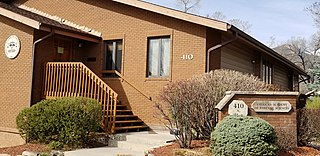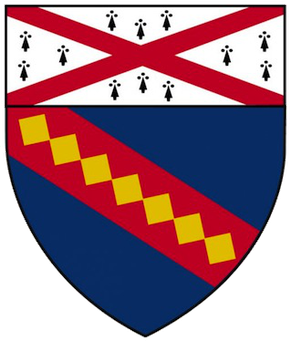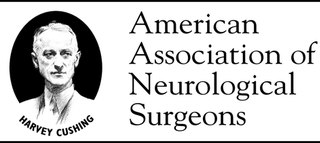
Arthur L. Caplan is an American ethicist and professor of bioethics at New York University Grossman School of Medicine.

The Presidential Advisory Council on HIV/AIDS (PACHA) advises the White House and the Secretary of Health and Human Services on the US government's response to the AIDS epidemic. The commission was formed by President Bill Clinton in 1995 and each president since has renewed the council's charter.

The American Academy of Forensic Sciences (AAFS) is a society for forensic science professionals, and was founded in 1948.
Albany Medical College (AMC) is a private medical school in Albany, New York. It was founded in 1839 by Alden March and James H. Armsby and is one of the oldest medical schools in the nation. The college is part of the Albany Medical Center, which includes the Albany Medical Center Hospital. Along with Albany College of Pharmacy, Albany Law School, the Dudley Observatory, and Union College, it is one of the constituent entities of Union University.
Ruth R. Faden is an American scientist, academic, and founder of the Johns Hopkins Berman Institute of Bioethics. She was the Berman Institute's Director from 1995 until 2016, and the inaugural Andreas C. Dracopoulos Director from 2014 to 2016. Faden is the inaugural Philip Franklin Wagley Professor of Biomedical Ethics.
The American College of Sports Medicine (ACSM), headquartered in Indianapolis, Indiana, is a sports medicine and exercise science membership organization. Founded in 1954, ACSM holds conferences, publishes books and journals, and offers certification programs for personal trainers and exercise physiologists.

The Yale School of Public Health (YSPH) was founded in 1915 by Charles-Edward Amory Winslow and is one of the oldest public health masters programs in the United States. It is consistently rated among the best schools of public health in the country, receiving recent rankings of 3rd for its doctoral program in epidemiology. YSPH is both a department within the school of medicine as well as an independent, CEPH-certified school of public health.
Mark Kuczewski is an American philosopher and bioethicist who has been a key contributor to the New Professionalism movement in medicine and medical education. In general, interest in professionalism has been widespread in medicine probably owing to the increasing regulatory and economic pressures on the practice of medicine. Many physicians have sought to identify the focal meaning of what it is to be a doctor in an effort to revitalize the profession. Kuczewski has been among a group that includes Richard and Sylvia Creuss, John Coulehan, and Matthew Wynia who see medical professionalism as including a commitment to social justice. That is, while professionalism entails such things as etiquette, communication skills, and basic medical ethics, professions are also expected to be leaders in educating the public and in advocating for the health of the public. Such leadership requires an understanding of the factors that lead some patient populations to be underserved and a commitment to bringing about social change to ameliorate these problems. The New Professionalism movement in medicine is a revival of communitarian bioethics that focus on the kinds of people and society we wish to be rather than on particular ethical questions of right and wrong. This focus on the relationship between the professional and the community can have important implications for medical education and professional development. While not eschewing case analysis and problem solving, the emphasis on the development of the person has created a renewed interest in narrative methods and reflection. Kuczewski has been an outspoken critic of efforts in medical education to focus on quantitative measures of professionalism education. He has argued that in an effort to make professionalism education “objective,” many medical educators are equating professionalism with trivial but easily measured behaviors. Kuczewski’s interest in professionalism and social justice has led him to pursue ethical issues in the interactions between medicine and recent immigrant populations. He has brought his work in communitarian and casuistic methods to bear on questions such as medical repatriation, insurance for undocumented immigrants, and the eligibility of DREAMers to become practicing physicians. His scholarship and advocacy was the catalyst for the Loyola University Chicago Stritch School of Medicine becoming the first medical school in the United States to explicitly welcome applications from DREAMers with Deferred Action for Childhood Arrivals (DACA) status. Under Kuczewski’s direction, the Neiswanger Institute for Bioethics and Health Policy at Loyola University Chicago has become a leader in educational programming to promote the relationship between medical professionalism and social justice. The Neiswanger Institute has contributed elements to the Stritch curriculum that explore the relationship between the business of medicine and social justice. The Institute also has online master of arts and doctoral programs that incorporating public health and leadership training in order to help health care professionals across the United States to promote service to the underserved. Kuczewski was elected president of the American Society for Bioethics and Humanities and served a two-year term from 2009 to 2011. The ASBH is the major professional association in the United States for individuals engaged in bioethics and medical humanities. During his term, the society aggressively began moving toward a process called Quality Attestation that will attest to the credentials and expected competence of clinical ethics consultants.

The American Association of Neurological Surgeons (AANS) is a scientific and educational association focused on advancing the specialty of neurological surgery. The organization has over 8,000 members around the world. It is one of the five Continental Associations of the World Federation of Neurosurgical Societies (WFNS), the other four being the AASNS, CAANS, EANS and FLANC.
Jonathan D. Moreno is an American philosopher and historian who specializes in the intersection of bioethics, culture, science, and national security, and has published seminal works on the history, sociology and politics of biology and medicine. He is an elected member of the National Academy of Medicine.

Olufunmilayo I. Olopade born in the year 1957, is a Nigerian hematology oncologist, Associate Dean for Global Health and Walter L. Palmer, Distinguished Service Professor in Medicine and Human Genetics at the University of Chicago. She also serves as director of the University of Chicago Hospital's Cancer Risk Clinic.
The Presidential Commission for the Study of Bioethical Issues was created by Executive Order 13521 on November 24, 2009. The Bioethics Commission advised President Barack Obama on bioethical issues arising from advances in biomedicine and related areas of science and technology. It replaced The President's Council on Bioethics appointed by United States President George W. Bush to advise his administration on bioethics, and the National Bioethics Advisory Commission (1996-2001). No national organization replaced it when its authorization expired; it "held its final meeting at the end of August 2016 and closed its doors."
The Dr. Nathan Davis Awards are presented annually by the American Medical Association (AMA) and awarded to elected and career public servants in national, state, and local governments for outstanding government service. These awards are named for the founder of the American Medical Association, Nathan Smith Davis.
Dimitrios P. Kontoyiannis is the Robert C Hickey Chair in Clinical Care and Deputy Head for Research in the Division of Internal Medicine at The University of Texas MD Anderson Cancer Center in Houston, Texas. He received his medical degree as valedictorian Summa Cum Laude from the National and Kapodistrian University of Athens, Greece. Kontoyiannis was trained in Internal Medicine at Baylor College of Medicine in Houston, where he served as a Chief Medical Resident. He was subsequently trained as a clinical fellow in Infectious Diseases at Massachusetts General Hospital and obtained a master's degree in Clinical Sciences from Harvard Medical School in Boston. He spent three years at the Whitehead Institute for Biomedical Sciences/Massachusetts Institute of Technology as a fellow in the Harvard MIT Clinical Investigators Training Program.
Theoretical Medicine and Bioethics: Philosophy of Medical Research and Practice is a bimonthly peer-reviewed medical journal covering bioethics and the philosophy of medicine with a more theoretical outlook than other journals in this area. It was established in 1980 as Metamedicine and was renamed Theoretical Medicine in 1983, obtaining its current name in 1998. It is published by Springer Nature and offered at a reduced rate to members of the American Society for Bioethics and Humanities. The editors-in-chief are Lynn Jansen and Daniel Sulmasy. According to the Journal Citation Reports, the journal has a 2018 impact factor of 0.789.
Laurie Zoloth is an American ethicist, currently Margaret E. Burton Professor at the University of Chicago Divinity School. She was the first Jewish dean of the Divinity School and served in the position from 2017 to 2018, whereupon she was invited to serve as the first Senior Advisor on Programs on Social Ethics for the University, an advisory administrative position.

Christine I. Mitchell is an American filmmaker and bioethicist and until her retirement in September 2022, the executive director of the Center for Bioethics at Harvard Medical School (HMS).






